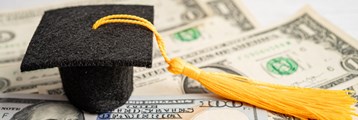How To Manage Your Student Loans During the Pandemic

Along with other bills, there is one type of bill causing many Americans to worry during the Coronvirus pandemic—Student Loans. Even before COVID-19, millions of Americans were suffering under high-interest student loan debt. Now, with lower incomes and overall financial insecurity, those with student loans are wondering if they will ever recover. This article features information on how to receive financial relief during the pandemic.
Federal Student Aid
The CARES Act, signed into law in March of 2020, also included relief for borrowers with federal student loans. Luckily, the U.S. Department of Education (ED) automatically placed all federal loans in repayment on forbearance from March 13, 2020, to September 30, 2020. The ED also reported that the automatic forbearance may be extended, as needed, based on guidance from the federal government. Most of these loans will also not accrue any interest during this time. Borrowers may still make payments if they wish to continue paying down their loans; however, automatic payments have been automatically suspended. If you made a payment after March 27, 2020, you can ask your loan provider for a refund. Further information can be found at studentaid.gov/announcements-events/coronavirus [balance.cmail20.com].
Private Loans
Unfortunately, the CARES Act relief does not apply to private student loans. However, many private banking institutions have followed the direction of the ED and put their borrowers on automatic payment forbearances with 0% interest. The length of the forbearance will vary by institution. You should check with your loan officer to see if you received an automatic forbearance and for how long. If your institution does not offer automatic forbearances, you may be able to request one based on the pandemic and any related economic hardships. If you are having difficulty making your student loan payments, you should contact your provider immediately to learn your available options.
Incurring More Debt
Many students may also be concerned about incurring more student loan debt during the pandemic. Most student loans do not require payments while you are in school. Therefore, if you are currently a student, and will be continuing throughout the pandemic, you should be able to continue as planned. Make sure to check the FAFSA website (studentaid.gov) regularly for any updates to your financial aid package due to the pandemic.
If you have any concerns about continuing your education and incurring more student loan debt in the midst of the crisis, you should consult with your school financial department and your student loan companies. If you recently graduated and are looking towards payments starting, you should confirm with your private lenders that payments will not become due during the pandemic. Your federal loans will be subject to the automatic forbearance until September 30, 2020, or later if extended.
Key Take Away
Meeting your basic needs during this trying time should be your top priority. If you have student loans and need to cut expenses, a good place to start is with your student loans. However, if you hold private loans and are unsure if you have an automatic forbearance or need to request one, you should contact your loan provider before stopping any payments. They may be able to provide you with options without incurring non-payment penalties. As with any debt, you should work proactively with your lender to let them help you rather than risk going into default. Given the pandemic, most companies are working with their customers to ensure student loans don’t overly burden individuals during this unprecedented time.





